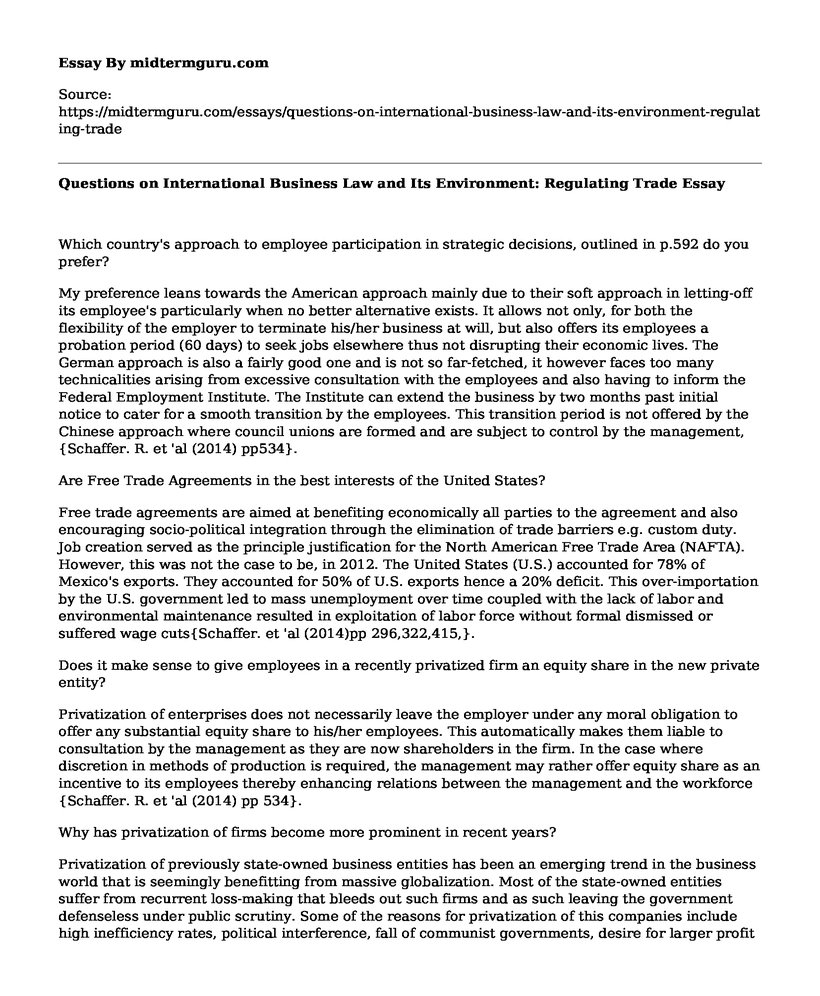Which country's approach to employee participation in strategic decisions, outlined in p.592 do you prefer?
My preference leans towards the American approach mainly due to their soft approach in letting-off its employee's particularly when no better alternative exists. It allows not only, for both the flexibility of the employer to terminate his/her business at will, but also offers its employees a probation period (60 days) to seek jobs elsewhere thus not disrupting their economic lives. The German approach is also a fairly good one and is not so far-fetched, it however faces too many technicalities arising from excessive consultation with the employees and also having to inform the Federal Employment Institute. The Institute can extend the business by two months past initial notice to cater for a smooth transition by the employees. This transition period is not offered by the Chinese approach where council unions are formed and are subject to control by the management, {Schaffer. R. et 'al (2014) pp534}.
Are Free Trade Agreements in the best interests of the United States?
Free trade agreements are aimed at benefiting economically all parties to the agreement and also encouraging socio-political integration through the elimination of trade barriers e.g. custom duty. Job creation served as the principle justification for the North American Free Trade Area (NAFTA). However, this was not the case to be, in 2012. The United States (U.S.) accounted for 78% of Mexico's exports. They accounted for 50% of U.S. exports hence a 20% deficit. This over-importation by the U.S. government led to mass unemployment over time coupled with the lack of labor and environmental maintenance resulted in exploitation of labor force without formal dismissed or suffered wage cuts{Schaffer. et 'al (2014)pp 296,322,415,}.
Does it make sense to give employees in a recently privatized firm an equity share in the new private entity?
Privatization of enterprises does not necessarily leave the employer under any moral obligation to offer any substantial equity share to his/her employees. This automatically makes them liable to consultation by the management as they are now shareholders in the firm. In the case where discretion in methods of production is required, the management may rather offer equity share as an incentive to its employees thereby enhancing relations between the management and the workforce {Schaffer. R. et 'al (2014) pp 534}.
Why has privatization of firms become more prominent in recent years?
Privatization of previously state-owned business entities has been an emerging trend in the business world that is seemingly benefitting from massive globalization. Most of the state-owned entities suffer from recurrent loss-making that bleeds out such firms and as such leaving the government defenseless under public scrutiny. Some of the reasons for privatization of this companies include high inefficiency rates, political interference, fall of communist governments, desire for larger profit margins only achievable through privatization all characteristic to state-owned firms, {Schaffer .R., Agusto .F. Dhooge .L.J. (2014)pp 342, pp 345}.The shelf value of products on sale in Non-Market Countries is prone to cost and price manipulation by the government which is unfavorable to the market, this loss making has resulted in bankruptcy e.g. steel industries in 1960.
What role, if any, can the U.S play in regulating international trade?
The U.S government may serve as an oversight authority to ensure transparency by multinational firms and partner trade states through the U.S. Department of Commerce Schaffer. et' al. According to Schaffer R. et' al 2014, they may also formulate and implement both domestic and foreign policies e.g. Sherman Antitrust Act
References
Schaffer, R., Agusti, F., Dhooge, L. J., & Earle, B. (2014). International business law and its environment. Cengage Learning.
Cite this page
Questions on International Business Law and Its Environment: Regulating Trade. (2021, Jun 03). Retrieved from https://midtermguru.com/essays/questions-on-international-business-law-and-its-environment-regulating-trade
If you are the original author of this essay and no longer wish to have it published on the midtermguru.com website, please click below to request its removal:
- Essay on Why Is Politics Filled With People From the Top 1% of America
- Elements of Good Governance - Paper Example
- Dialog About Government and Politics - Paper Example
- Essay Sample on the Second War for Independence and the Upsurge of Nationalism
- The Future of Unions - Essay Sample
- Pre-Fabricated Housing Policy - Essay Sample
- A Look at Healthcare Costs: Limiting Factors for Americans - Essay Sample







